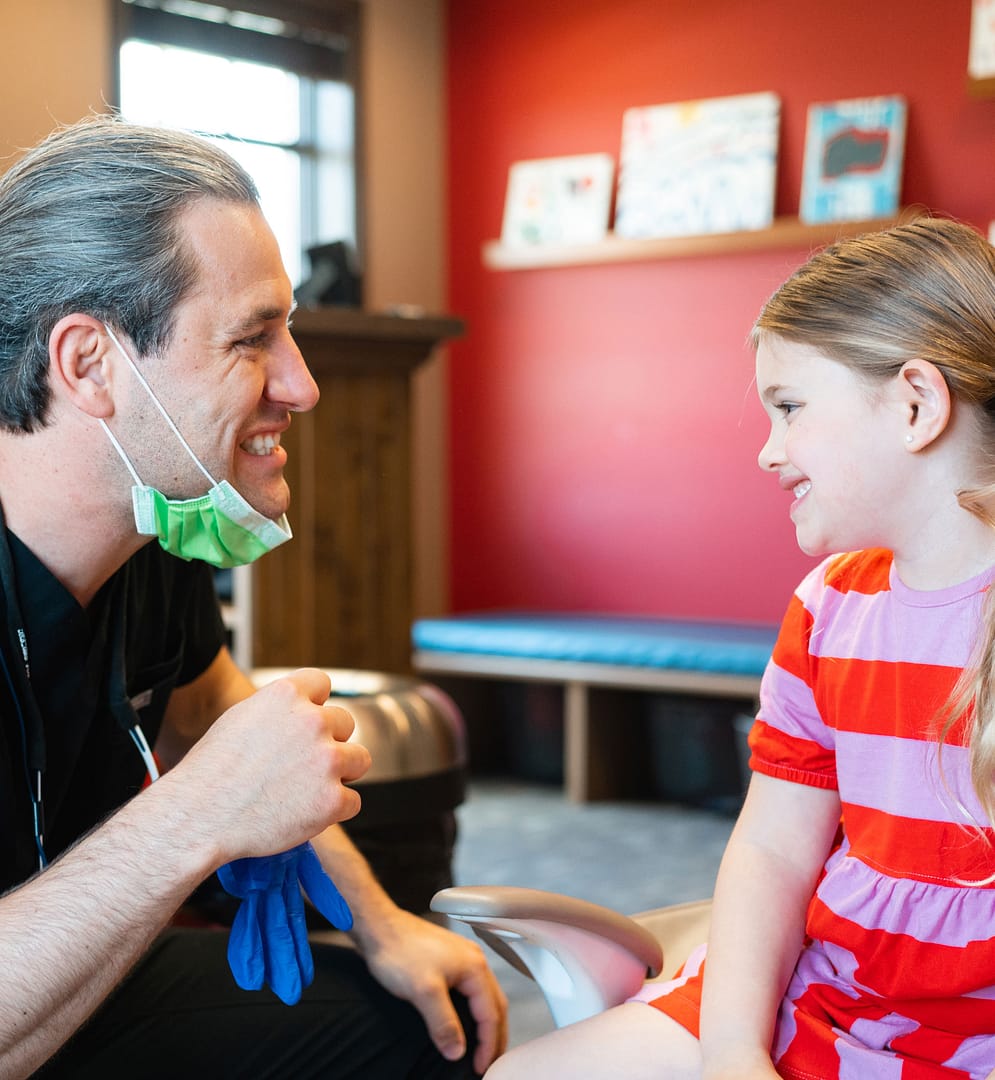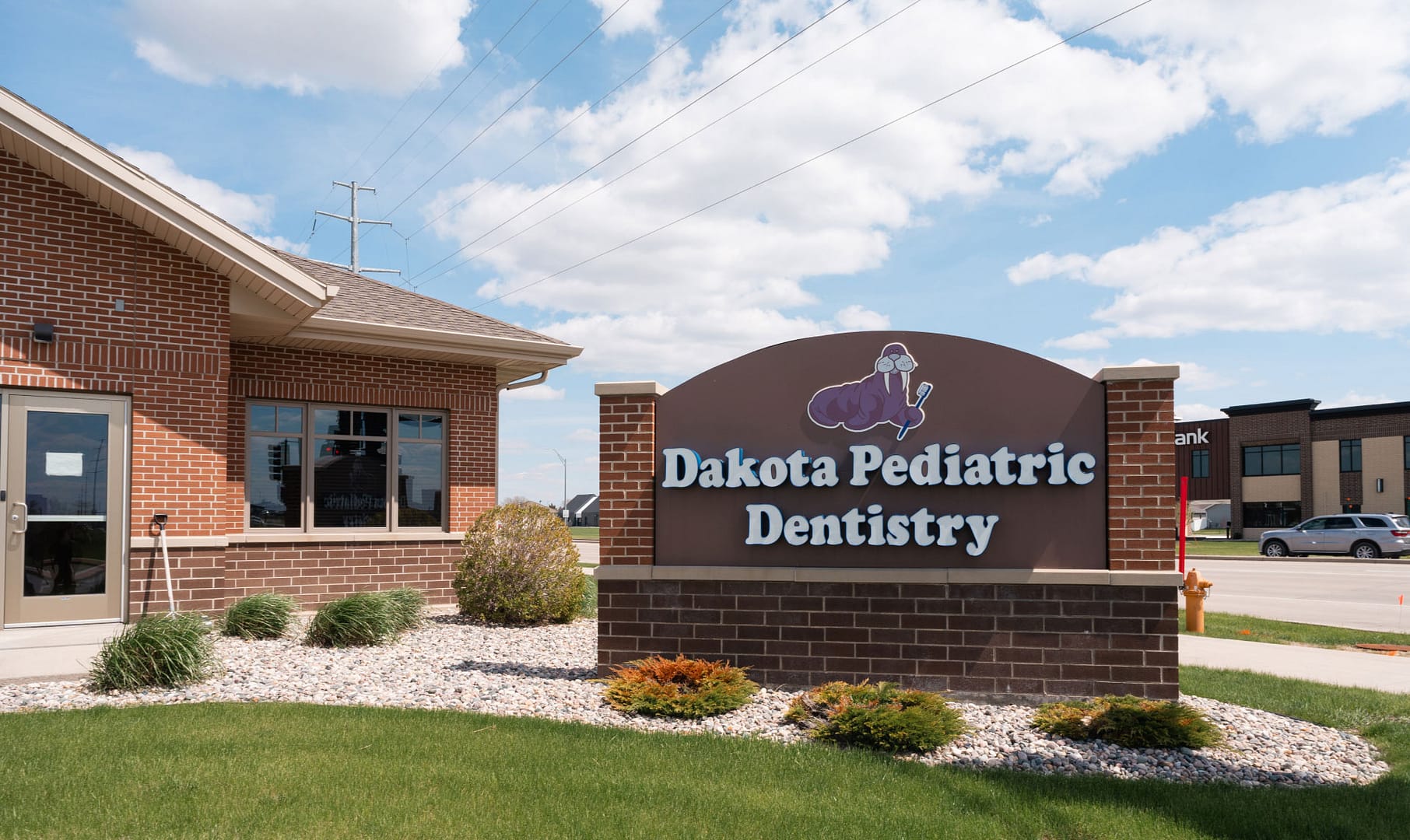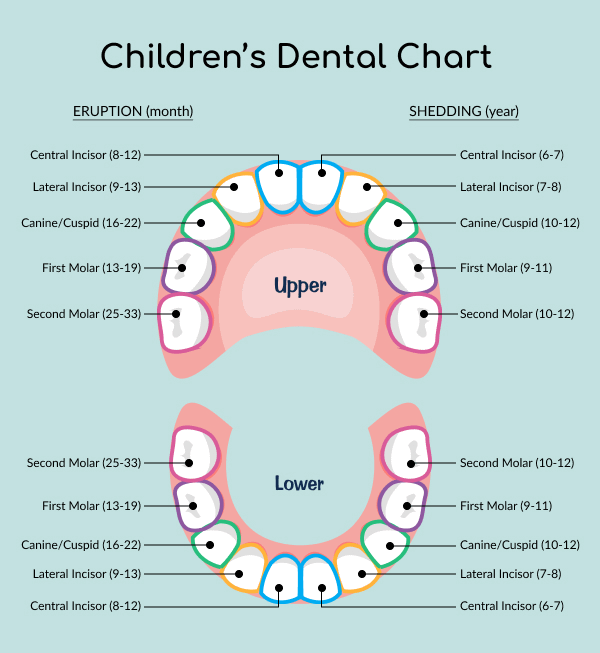Pediatric Oral Health Guide
Baby Teeth
WHY ARE THEY IMPORTANT?
Some people don’t realize baby teeth, sometimes called primary teeth, are very important. Yes, they fall out eventually, but they play an important role so your child can chew and eat correctly, and they help guide the permanent teeth into position. Baby teeth also aid the normal development of your child’s jawbone and muscles.
Additionally, issues with baby teeth can affect speech development and aesthetics as your child grows. This can have a significant impact on your child’s self-esteem as they move through childhood. Protecting your child’s baby teeth from decay and damage is an important step toward them having a healthy smile into adulthood.
Teeth Formation
FOR BABIES AND TODDLERS
Your child’s teeth actually start forming before birth. The eruption time of the first teeth varies, but infants can see their first teeth around 8 months old, and most kids have all 20 baby teeth by age 3. However, the order and pace of eruption varies.
Adult teeth begin appearing around age 6, starting with the first molars and lower central incisors. Typically, at age 8, you will see the four bottom teeth (lower central and lateral incisors) and the four top teeth (upper central and lateral incisors) fall out with permanent teeth replacing them. By age 13, the remaining permanent teeth will arrive. In total, adults have 28 teeth, or 32 including the four wisdom teeth.
Dental Emergencies
TIPS FOR PARENTS
Sometimes, accidents happen, and your child may need emergency dental care. Or perhaps your child has a toothache, and you’re wondering what you can do as a parent to alleviate their pain. Here are some tips for parents about what to do for these common dental problems:
Clean the affected tooth and rinse the mouth thoroughly with warm water. Alternatively, you can use dental floss to remove any food. If pain persists or the face is swollen, contact Dakota Pediatric Dentistry immediately.
Apply ice to the injured area to reduce swelling. If bleeding occurs, apply pressure with a gauze or a cloth. If this doesn’t control the bleeding, call a doctor or visit your nearest hospital emergency room.
For a baby tooth, contact Dakota Pediatric Dentistry. A baby tooth will not be reinserted as it can potentially damage the incoming permanent tooth. Your dentist will advise you about what to do next.
For a permanent tooth, find the tooth and handle it by the crown only, not the root. If you need to rinse it, use water only. DO NOT clean it with soap or anything else, and keep handling to an absolute minimum. Inspect the tooth for fractures and, if it’s alright, try to reinsert it back into the socket. Ask your child to hold it in place by biting on a gauze or a clean cloth. If you cannot place the tooth back into the socket, transport it in a cup with the patient’s saliva or milk (not water) and see a dentist immediately. This is a dental emergency, and time is a critical factor to saving the tooth.
For either a baby tooth or a permanent tooth, contact Dakota Pediatric Dentistry. With permanent teeth, quick treatment is critical to reduce the chance of infection and the need for extensive dental treatment. The patient needs to rinse their mouth with water and apply a cold compress to reduce any swelling. If you find the broken piece of tooth, bring it with you to the dentist in a container of the patient’s saliva or milk (not water).
Call 911 or take your child to the nearest hospital emergency room.
Try to keep the jaw as still as possible, and take your child to the nearest hospital emergency room.
Dental X-Rays
THE IMPORTANCE OF DIAGNOSTIC TOOLS
X-rays can detect cavities, survey erupting teeth, help diagnose bone disorders, evaluate injuries, and help planning of orthodontic treatment. They allow dentists to diagnose and treat dental conditions that can’t be seen with a clinical evaluation. When problems are identified early, dental treatment is more comfortable for your child, and they can avoid complex, expensive procedures in the future. How regularly your child needs dental X-rays may vary depending on their risk factors.
X-rays are safe, and pediatric dentists are careful to minimize radiation exposure. Having an X-ray represents a far smaller risk than if your child has an undetected and untreated dental problem. We use lead body aprons to protect your child. Today’s modern equipment restricts the full strength of the X-ray beam to the area of interest.
Toothpaste
HOW TO CHOOSE THE RIGHT ONE
Some toothpastes contain harsh abrasives that can wear away your child’s tooth enamel. Parents should choose a toothpaste recommended by the American Dental Association as these products have undergone testing to ensure they are safe. You only need to apply a small amount of toothpaste the size of a grain of rice to brush the teeth of a child younger than age three. For children ages 3 to 6, use a pea-size amount of toothpaste. Assist young children with brushing as they cannot do this effectively by themselves.

Bruxism
TEETH-GRINDING PROBLEMS
Teeth grinding, or bruxism, is very common in children, especially in their sleep. Many cases do not require intervention or professional treatment. However, if you can see your child has excessive wear as a result of bruxism, you should seek treatment from your pediatric dentist. A mouth guard may also help.
Thumb Sucking
WHEN IS IT A PROBLEM?
Sucking is natural for infants and young children. They may use their thumbs, fingers, or a pacifier to make them feel secure or to induce sleep. But thumb sucking beyond the eruption of the permanent teeth can cause issues for both the mouth and tooth alignment.
To encourage your child to stop thumb sucking, parents can:
- Try to address the cause of anxiety
- Comfort the child
- Reward children when they stop sucking their thumbs
Your pediatric dentist can also help by explaining to your child why it’s important to not suck their thumbs.
Early Infants and Oral Care
HOW PARENTS CAN SUPPORT HEALTHY SMILES
Baby bottle tooth decay is common among young children. It is caused by frequent, long exposures to sugary liquids. These include milk (and breast milk), formula, fruit juice, and other sweetened drinks. Parents should wipe their baby’s gums and teeth with a damp washcloth or gauze pad to remove plaque after each feeding. We also recommend only giving your child water at nighttime instead of milk or other drinks.
When your child’s teeth erupt, use a soft toothbrush to brush them. Parents should brush their children’s teeth until the children are old enough to do this properly themselves. Healthy eating habits are also a key factor in having healthy teeth as some snacks can lead to cavities. Parents should choose nutritious foods as snacks, such as vegetables, low-fat yogurt, or low-fat cheese, instead of candy and high-sugar foods.
Oral Care for Older Children
HOW PARENTS CAN SUPPORT HEALTHY SMILES
Older children should brush their teeth at least twice a day and floss daily. They should also avoid snacks that are high in sugar. Sports drinks are particularly high in sugar and acids and should be avoided. Hydrating with water is a much better option.
Children and adolescents should visit their dentist every six months. Routine visits create positive oral health habits and set your child up for a lifetime of healthy smiles.
Dakota Pediatric Dentistry offers services in two convenient locations.

Fargo
Our Fargo office is conveniently located at
4423 45th Street S. in Fargo.
OFFICE HOURS:
Monday-Thursday 8:00am-4:30pm
Fridays 8:00am-3:00pm

Grand Forks
Our Grand Forks office is conveniently located at
3990 S. Columbia Road in Grand Forks.
OFFICE HOURS:
Monday-Thursday 8:00am-4:30pm
Fridays 8:00am-3:00pm
Afford Your Care
A Variety of Payment Options for the Best Possible Dental Care
At Dakota Pediatric Dentistry, we’ll work with you to maximize your insurance benefits. We estimate your out-of-pocket expenses and file claims with your insurance company to streamline the process.
We accept cash, checks, Visa, Mastercard, Discover, American Express, and CareCredit.
If you have any questions about payment options or insurance, please contact us.
